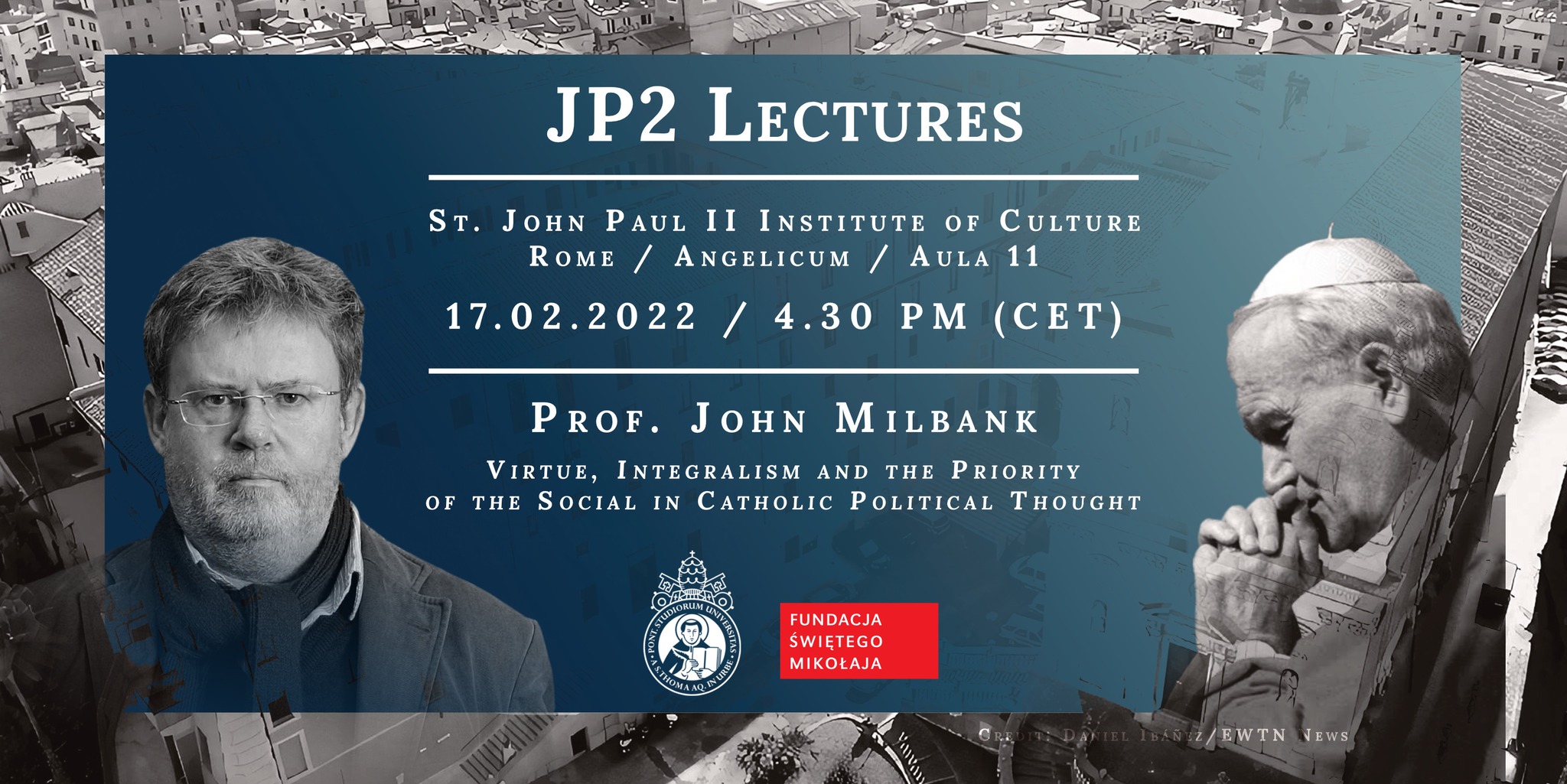John Milbank: Virtue, Integralism and the Priority of the Social in Catholic Political Thought (in EN+IT)


On Thursday, February 17, we invite you to the next lecture of the 2021/22 series of “JP2 Lectures”, organized by the St. John Paul II Institute of Culture at the Angelicum, which will be given by Professor John Milbank (University of Nottingham). The lecture, entitled “Virtue, Integralism and the Priority of the Social in Catholic Political Thought”, will start at 4.30 PM (CET) in Aula 11, at the Angelicum (address: Largo Angelicum, 1, 00184 Roma).
*
Giovedì, 17 febbraio vi invitiamo alla prossima conferenza del Ciclo di Lezioni GP2 (JP2 Lectures) 2021-22, organizzata dall’Istituto di Cultura San Giovanni Paolo II dell’Angelicum, che sarà tenuta dal professor John Milbank (University of Nottingham).
La conferenza, intitolata “Virtue, Integralism and the Priority of the Social in Catholic Political Thought”, avrà inizio alle ore 16.30 nell’Aula 11 dell’Angelicum (indirizzo: Largo Angelicum, 1, 00184 Roma).
LINK: https://youtu.be/bd2JcXhW7dU
Join: https://www.facebook.com/events/460117708995156
For on-site participants: please register at: https://www.eventbrite.it/e/jp2-lecture-prof-john-milbank-virtue-integralism-and-the-priority-tickets-249139361537?fbclid=IwAR2mK3AajcY8hjDG6K9cmAVwXZmazNJ7S3CKZasHb5CU76vLHgg-bRbrpLI
*
There is huge confusion around the words ‘Integralism’ and ‘integral’. Neo-scholastics today returning to Integralism are the very people who tend to oppose the integral unity of nature and grace! In consequence, they confuse an integral political order with theocracy and church authority with church power.
It may be time to ask once more whether subsidiarity implies distributism and corporatism, and whether solidarity and dignity imply a society of ‘estates’ and ‘orders’ in a reconfigured sense, besides Aristotelian mixed government, rather than pure democracy.
Today we need to re-echo Max Scheler (such a big influence on John Paul II) and Emmanuel Mounier, in asking what a specifically ‘Christian Socialist’ or ‘Christian Sociological’ politics and economics might imply. Also following John Paul II, we need to think more about how a correct Catholic internationalism can be matched by an integral incarnation of Catholicity within specific national and local cultures. The strange alliance of an ultramontanist and over-centralised church (as Pope Francis perceives) with liberalism and laicite within nations no longer looks sufficient and has contributed to Christian decline.Professor John Milbank – born in 1952 in Kings Langley, England, is an English Anglican theologian and Emeritus Professor in the Department of Theology and Religious Studies at the University of Nottingham, where he is President of the Centre of Theology and Philosophy. He is the most prominent representative of the trend of thought known as Radical Orthodoxy. A characteristic feature of this movement is the crossing of the conventional boundaries between theology, philosophy, political and social theory.
*
The monthly open “JP2 Lectures” given by scholars from around the world are offered by the St. John Paul II Institute of Culture at the Faculty of Philosophy at the Pontifical University of St. Thomas Aquinas – the Angelicum in Rome, the Roman Alma Mater of fr. Karol Wojtyła. The guest speakers in the 2021-22 JP2 Lectures series are: John, Lord Alderdice, Jean-Luc Marion, George Weigel, Andrea Riccardi, John Milbank, Carl A. Anderson, Ewa Thompson, Bishop Robert Barron (tbc.), and Stanisław Grygiel.
The lecturers in 2020-21 were: Cardinal Gianfranco Ravasi, John Finnis, Bp Rowan Williams, Marek A. Cichocki, John Cavadini, Francois Daguet O.P., Chantal Delsol, Rémi Brague, Renato Cristin, and Dariusz Gawin.
Per i partecipanti in loco: si prega di registrarsi su: https://bit.ly/3uSY7LA
La conferenza sarà anche trasmessa in diretta: https://youtu.be/bd2JcXhW7dU
Evento facebook: https://www.facebook.com/events/460117708995156
*
C’è una grande confusione intorno alle parole ‘Integralismo’ e ‘integrale’. I neo-scolastici che oggi ritornano all’Integralismo sono le stesse persone che tendono ad opporsi all’unità integrale della natura e della grazia! Di conseguenza, confondono un ordine politico integrale con la teocrazia e l’autorità della chiesa con il potere della chiesa.
Forse è il momento di chiedersi ancora una volta se la sussidiarietà implichi il distributismo e il corporativismo, e se la solidarietà e la dignità implichino una società di ‘tenute’ e ‘ordini’ in senso riconfigurato, oltre al governo misto aristotelico, piuttosto che la democrazia pura.
Oggi abbiamo bisogno di riecheggiare Max Scheler (una grande influenza su Giovanni Paolo II) e Emmanuel Mounier, chiedendoci cosa potrebbe implicare una politica ed economia specificamente ‘cristiano-sociologica’ o ‘cristiano-sociologica’. Anche seguendo Giovanni Paolo II, abbiamo bisogno di pensare di più a come un corretto internazionalismo cattolico possa essere accompagnato da un’incarnazione integrale della cattolicità all’interno di specifiche culture nazionali e locali. La strana alleanza di una chiesa ultramontanista e troppo centralizzata (come percepisce Papa Francesco) con il liberalismo e la laicità all’interno delle nazioni non sembra più sufficiente e ha contribuito al declino cristiano.
*
Il professor John Milbank – nato nel 1952 a Kings Langley, Inghilterra, è un teologo anglicano inglese e professore emerito nel dipartimento di teologia e studi religiosi dell’Università di Nottingham, dove è presidente del Centro di teologia e filosofia. È il rappresentante più importante della corrente di pensiero nota come Ortodossia radicale. Una caratteristica di questo movimento è il superamento dei confini convenzionali tra teologia, filosofia, teoria politica e sociale.
*
Le “Lezioni GP2” sono offerte mensilmente da studiosi di tutto il mondo dall’Istituto di Cultura San Giovanni Paolo II presso la Facoltà di Filosofia della Pontificia Università San Tommaso d’Aquino – l’Angelicum di Roma, l’Alma Mater romana di fr. Karol Wojtyła. I relatori ospiti della serie “JP2 Lectures” del 2021-22 sono: John, Lord Alderdice, Jean-Luc Marion, George Weigel, Andrea Riccardi, John Milbank, Carl A. Anderson, Ewa Thompson, Bp. Robert Barron (tbc.), Stanisław Grygiel.
I docenti nel 2020-21 sono stati: il Cardinale Gianfranco Ravasi, John Finnis, Bp. Rowan Williams, Marek A. Cichocki, John Cavadini, Francois Daguet O.P., Chantal Delsol, Rémi Brague, Renato Cristin, Dariusz Gawin.




Dodaj komentarz